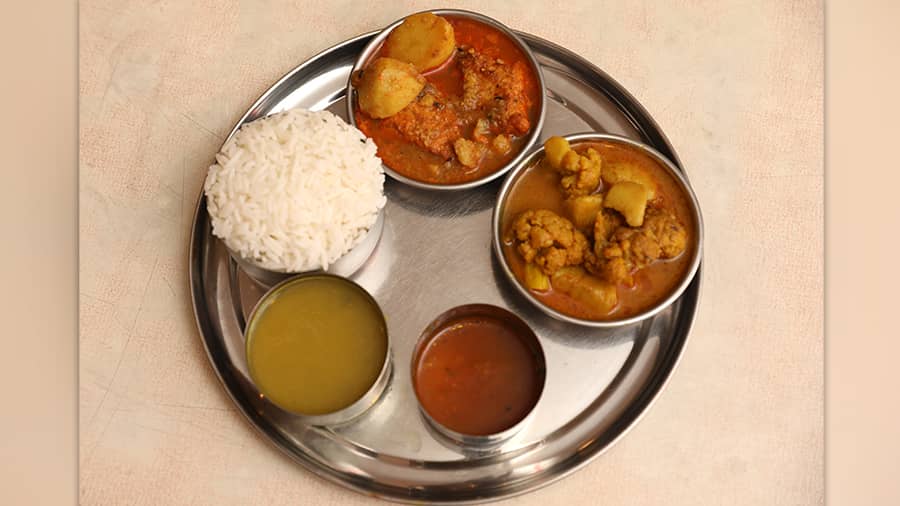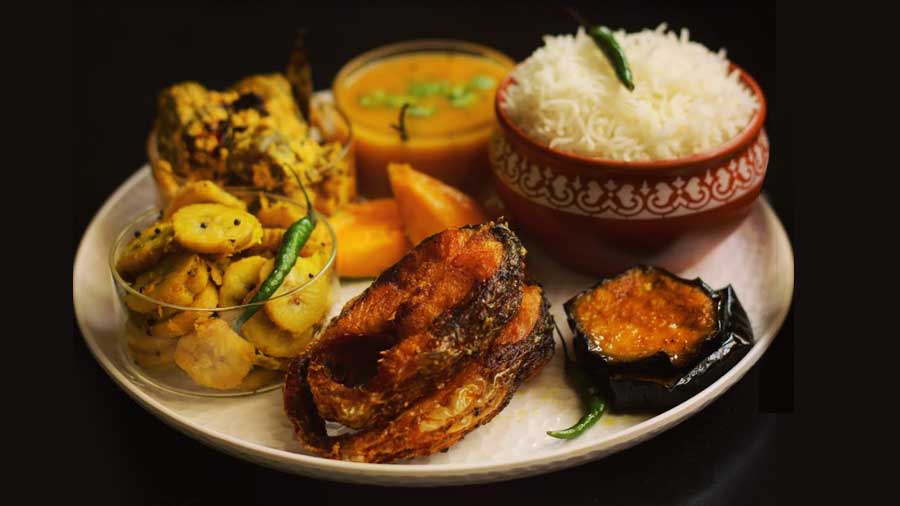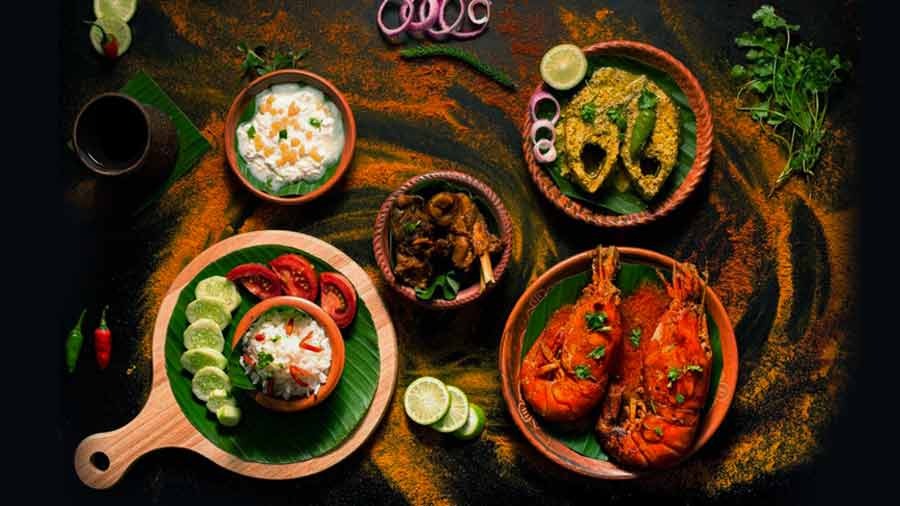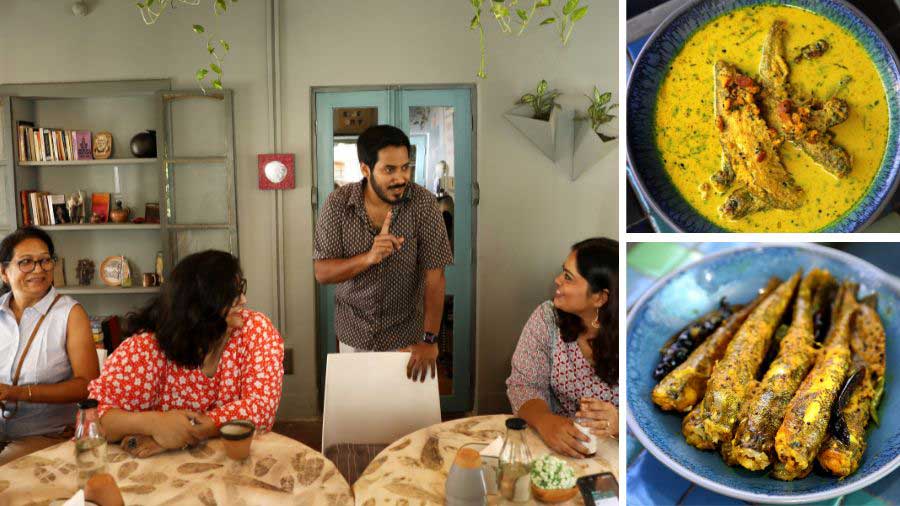For decades since its inception, Suruchi Restaurant, on 89, Elliot Road in the city’s Taltala area, was synonymous with good Bengali food. From bhapa ilish to chitol muitha and bhetki paturi, it served everything that most Bengalis swear by. It still does. But more than the food it was, perhaps, the ambience of simplicity that gave it that special feel. As if the women who worked the kitchen had pooled their newfound stability into serving up stuff homely and authentic. A sort of alternative fulfilment after being saved from what would have been a life of torment.
The business thrived too. Some of those who visited the restaurant were well-known public figures, among them Prince Charles, then not yet a king, and former West Bengal chief minister, Jyoti Basu.
With the passage of time, though, the restaurant, now run by the Elliot Road Suruchi Self Help Group, has gone through many changes, even upheavals, and is today a shadow of what it was.
The restaurant still opens every day, catering to customers who enjoy Bengali cuisine, but that taste of the past has gone, irretrievably perhaps. Rising prices, extensive use of chemicals and fertilisers in farming, abundance of taste-enhancing ingredients and other factors have all done their bit, an admixture more potent than even nostalgia. But the people who run the eatery — the self-help group’s secretary, Papiya Choudhury, and her 12 associates — soldier on. They have to; their survival is at stake.
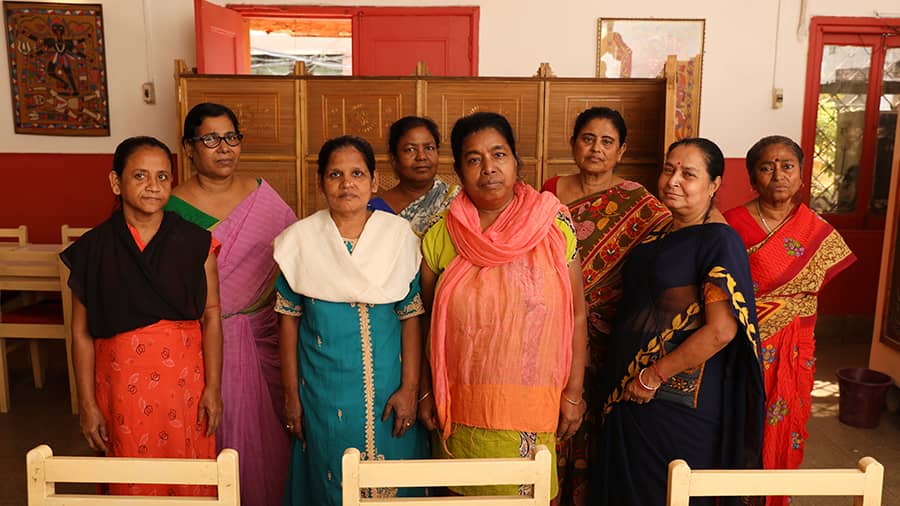
Papiya Choudhury (right), the present president of the association and overseer of the entire operations, and some of the ladies who help in holding aloft the torch of women empowerment against all odds
But there’s another compelling reason. Suruchi stood for empowerment. That was how it started, as both refuge and purpose. My Kolkata spoke to Choudhury and spent some time at the restaurant, taking pictures, talking to the staff, before coming away with an engrossing tale of what it once was and how things are today.
So, how did the story of Suruchi begin?
Well, the answer is, it didn’t begin with Suruchi. For that matter, it didn’t even begin as a restaurant. It started as a rehab effort that would reinvent itself over time. And the credit for that effort goes to a 90-year-old women’s organisation.
A brief recap
The origin of the restaurant, as we see it today on Elliot Road, can be traced back to 1932, when some intrepid ladies led by Romola Sinha founded the All Bengal Women’s Union (ABWU), an organisation that worked to rehabilitate distressed women. Those were turbulent times. Bengal had been partitioned once, in 1905, on religious lines and although that territorial division would be revoked six years later, the threat of another split hung heavy. That fear would come true in 1947, when the subcontinent would be partitioned, but thousands, including women and children, had already begun migrating from either side to the other in search of safety of faith and numbers. It was in this situation that the ABWU stepped up to offer some of these refugee women a chance to rebuild their lives, away from the grasp of prowling traffickers.
Among the other distinguished women who were part of the movement were Suniti Devi, the Maharani of the then princely state of Cooch Behar and daughter of Brahmo Samaj reformist Keshub Chandra Sen, her sister Sucharu Devi, the Maharani of the then Mayurbhanj state, and Charulata Mukherjee.
Sinha and Mukherjee were both women’s rights activists who fought to abolish social problems like the Devadasi system and prostitution. Suniti Devi and Sucharu Devi were instrumental in founding the Maharani Girls’ High School at Darjeeling in 1908.
Coming back to the ABWU, its premises would serve as a shelter for distressed women from all over the state, through the 1930s and then around the time of Independence, when hundreds of thousands of refugees from East Pakistan, today’s Bangladesh, crossed the border and settled in this side of Bengal, many of them in Kolkata and its suburbs.
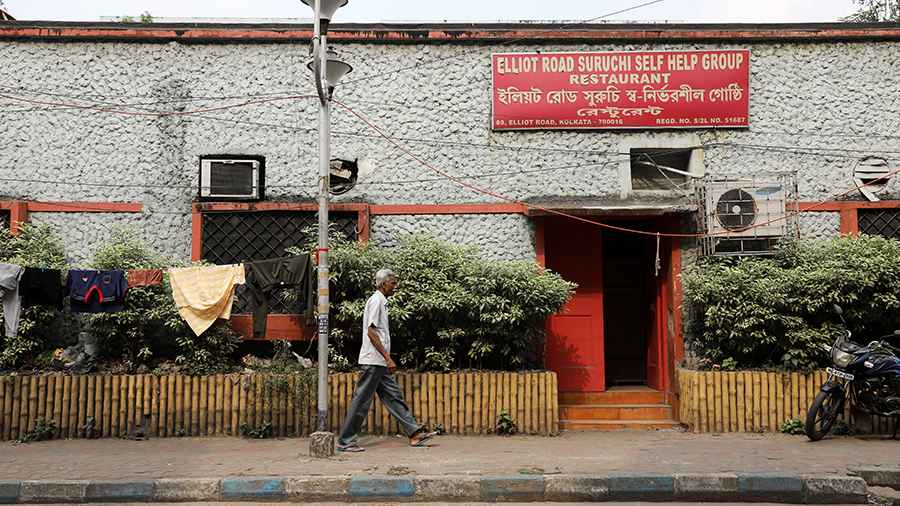
Stuck in time: The entrance of Suruchi Restaurant
The need of the hour was to rehabilitate these women who faced a life of exploitation. One way to do that was to help them become self-reliant. That was how the ABWU came up with the idea of engaging these women in one of the things they were good at: cooking. Thus was born Annapurna Mistanna Bhandar, a sweet-manufacturing enterprise from the same Elliot Road premises.
“This establishment owes its origins to the leadership of Romola Sinha, founder member of the ABWU, and others like Suniti Devi, Charulata Mukherjee and Sucharu Devi. They not only helped restore the dignity of the displaced women but would also be the guiding light for later generations of women activists in Bengal,” says Choudhury, the secretary of the Suruchi Self Help Group.
Annapurna Mistanna Bhandar was established sometime in the year 1953 and, before long, it would be supplying traditional Bengali sweets to multiple addresses in the city. Needless to say, the items it offered — rangaalu puli, gokul pithe, chale’r payesh and chhana’r payesh — were a hit.
Cause and effect
A few years down the line, Annapurna would expand its bhandar to add refreshments similar to ‘tiffin foods’, such as roti and vegetable curries, which would be supplied to establishments such as PG Hospital, Vidhan Sabha (the Legislative Assembly) and Nil Ratan Sircar Hospital, among others. Those were good times for the women of Annapurna. But it was too good to last.
Sometime in the early seventies, most of the establishments they supplied, started introducing canteen services of their own, which meant bulk orders dried up. Falling revenues and the need to ensure continued support to these women necessitated a rethink. The solution was to start an eatery, within the same premises, where food could be served to the patrons. Till then, there had been no arrangement for patrons to sit and savour the authentic Bengali sweets on offer. That was how Suruchi restaurant was started, either in 1971 or the following year. The business prospered again and, over the years, more women would join the restaurant to help it cope with rising customer demands. What had started with a handful of individuals soon had around 40 women on its rolls.
Signature dishes
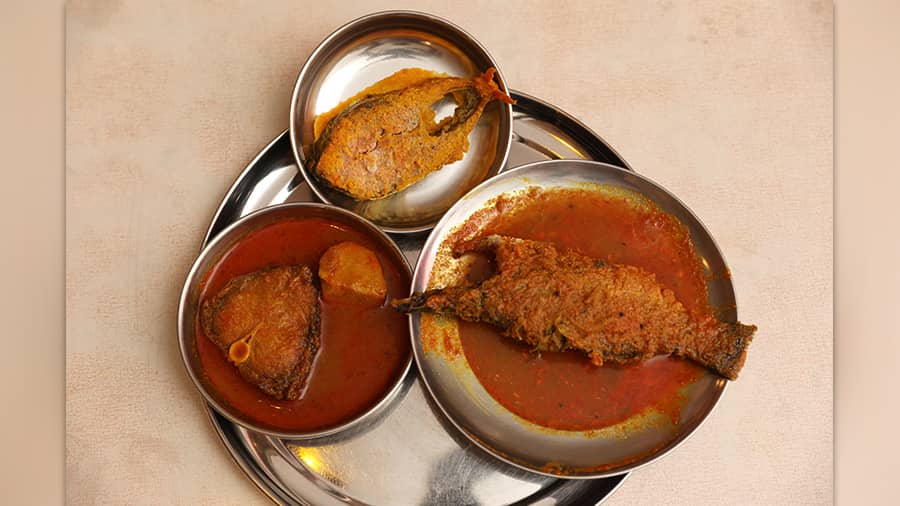
A slice of gourmet heaven: Varieties of fish dishes at the restaurant
Since many of Suruchi’s clients traced their ancestry to Purbo Bangla (East Bengal), the restaurant made sure that its special items satisfied their palate. “Unlike anywhere else in the city, at Suruchi you will always get ilish (hilsa) items. Our speciality is bhapa (steamed) ilish. Apart from that we have chitol muitha and bhetki paturi,” says Choudhury.
There are special dishes for vegetarians too, such as kumro jhinge’r paturi and phul kopi’r (cauliflower) paturi, a dish apparently not found everywhere. Snack items include koraishuti’r (peas) kochuri, available round the year; dhania (coriander) kochuri and the very popular daal (pulses) puri.
The restaurant follows the traditional form of niramish ranna (vegetarian style of cooking) that does not allow the use of onion and garlic. Even masoor daal is not used very often. “We use jeera and aada (cumin and ginger). Even the alu’r dum we make does not have onion or garlic and is always made with curd, cumin and ginger. Only rarely do we use asafoetida and onion seeds but that too after asking the customer,” Choudhury says.
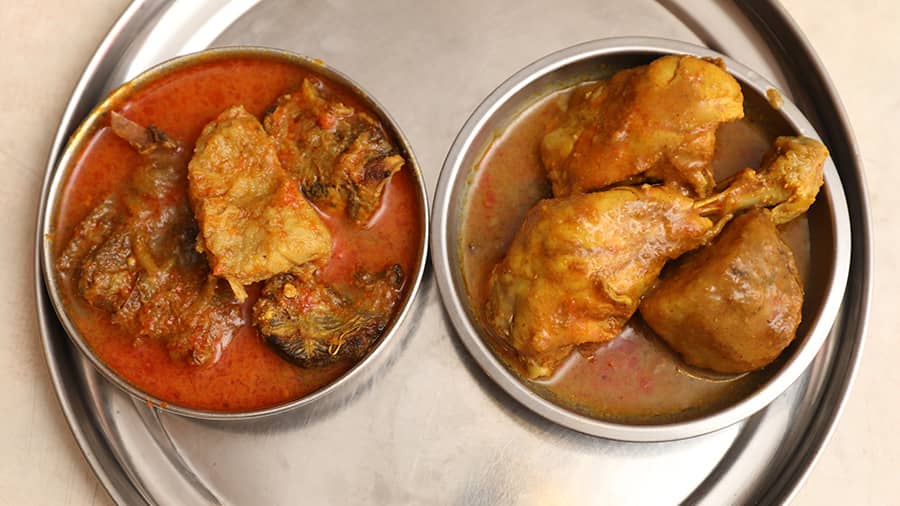
That delectable ‘something more’ for mutton and chicken lovers
But the items, she concedes, rarely capture the taste and flavour of the past. “As someone who has been in the food trade for many years, I can say that the taste of vegetable and other things, grown as they are with harmful chemicals and fertilisers, has gone down. That means we can’t recreate the taste of the items served earlier. The abundance of ready masala and spices in the market has also created a palate of its own.”
What do the patrons say?
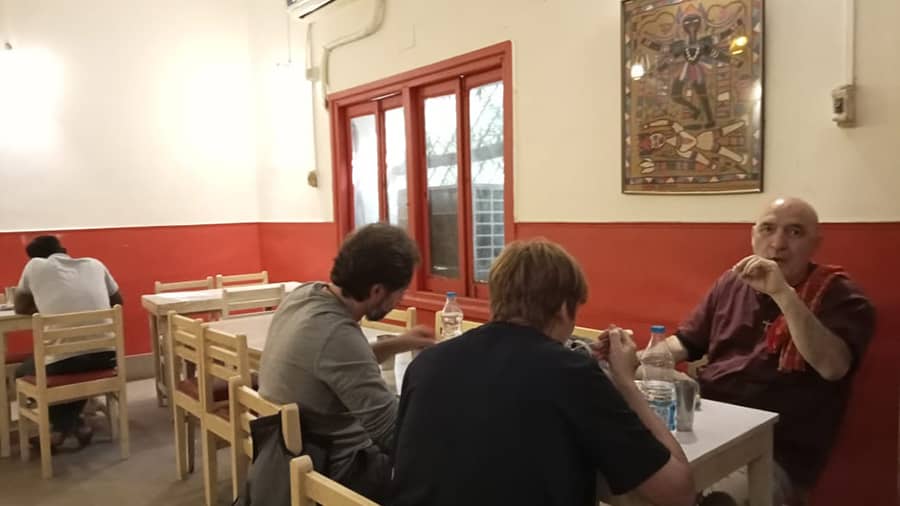
‘Because of my profession I meet many Europeans, and it fills my heart with pride when they enjoy and praise the Bengali cuisine this eatery unfailingly offers every time,’ said a patron
“I have been a regular at this restaurant for years now,” B. Das, a social worker and entrepreneur, told My Kolkata as he waited to be served.
Das (not his real name as he requested anonymity) said the “one factor” that had appealed to him was the “authentic Bengali cuisine” Suruchi served. “Because of my profession I meet many Europeans, and it fills my heart with pride when they enjoy and praise the Bengali cuisine this eatery unfailingly offers every time. The setting may disappoint many but when the food is served, nothing else matters much. The charm, the uniqueness, both of cause and quality, is hard to miss.”
Also hard to miss is the glow on the face of Suruchi’s women when they mention past visitors: Charles III, now the king of the United Kingdom, his sister Princess Anne, former chief minister Basu, the late CPM patriarch, and his party comrade Biman Bose.
For many, it’s nostalgia that brings them back, even after they have left the city. Samiran Saha, a journalist based in New Delhi, said he would visit the restaurant as a child. “I come here every time I am in Kolkata. The décor has changed over the years but this place has an ambience of its own. I can’t make out whether it’s the food or the chance to be in a room where I would come with my mother and aunt.”
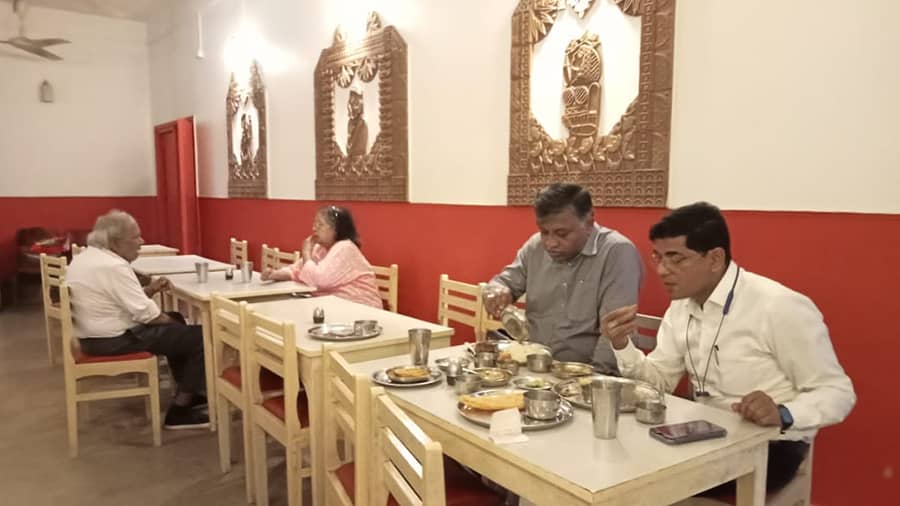
For many, it’s nostalgia that brings them back, even after they have left the city
Food, then, is a common factor that draws people to the restaurant, which is all the more impressive considering that Suruchi went through another change forced by circumstances. This time, though, the reasons would be the economics of increasing competition and changing tastes of a new generation. As the business suffered, the staff strength dwindled before the ABWU finally decided to shut down the eatery.
Another crisis — and solution
Had the restaurant been shut down, it would have been like a hammer blow to the 20-odd individuals whose lives were inextricably linked to the establishment. Closure would have meant not only loss of livelihood, but also the end of a dream. So, one day, they sat down together and decided to help themselves. They would run the restaurant on their own.
Help also came from within the ABWU as a section of members supported their decision. The women then pooled resources, registered the restaurant under a new name and started afresh in 2013. With that began the tale of Suruchi’s present avatar — the Elliot Road Suruchi Self Help Group Restaurant. It was a gamble but the rechristened restaurant survived. There would be days when people would wait long outside for a table.
A jolt, again
Just when it seemed the restaurant had turned the corner, another jolt nearly ended its extended run. The Covid-19 lockdown, which would have a devastating effect on business ventures worldwide, didn’t spare Suruchi either. By the time the world returned to normal, the restaurant’s staff strength had depleted further. Today, Choudhury, the self-help group’s secretary, and others like Shiuli Das, Aparna Dey, Parul Bhattacharya, Urmila Mondal and Kumkum Das are still trying to come to terms with the impact of the biggest disruption on their business so far. The journey ahead is tough but quitting would mean giving up on something that had sustained them for so long.
“I have dedicated myself to this restaurant,” Shiuli says, speaking for everybody. “I failed in everything, whether it was studies or something else; cooking is what kept me and my hopes alive.”
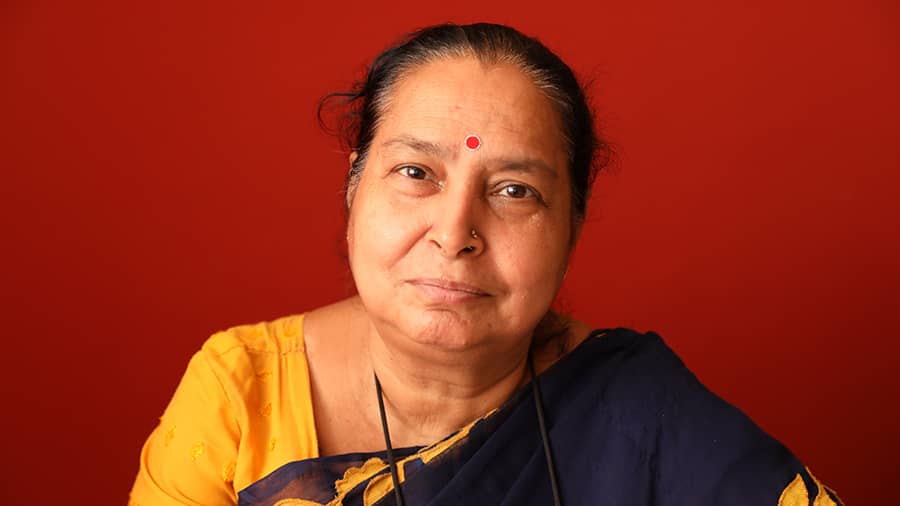
‘We are at a point where even thinking about the future of the establishment is daunting.’ says Papiya Choudhury
But the journey ahead, Choudhury concedes, is tough. “Price rise has been the biggest culprit. Prices of ingredients have not just doubled, they have tripled in recent times. Bengalis love fish, it’s their lifeline, but look at the price of specific popular varieties. Our overheads — electricity, gas and other items — have gone up. We are at a point where even thinking about the future of the establishment is daunting.”
Had they thought of going online too?
“We don’t do online business. We are not professional food sellers but an organisation for the rehabilitation of distressed women,” Choudhury says.
Choudhury said the restaurant had been forced to increase the price of items because of the high raw material prices and incidental costs. “Our client base has gone down and that also has led to a recalibration of prices, but we remain hopeful that people will appreciate what our goal is and extend their patronage.”
